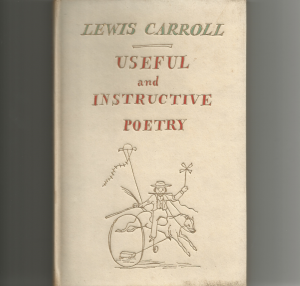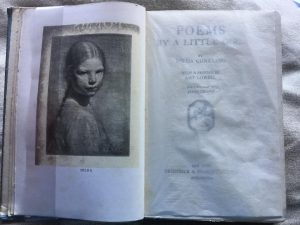I decided to have a quick look into published poets who were children, as opposed to those writing for children. It turns out that some of these were writing a very long time ago. Incidentally, this is going to be more of a “fact meal” than a “fact bite”, and I have only researched four writers!
My first author, who wrote Poems on Various Subjects, which was published over 240 years ago, in 1773, had her first poems published in an American newspaper when she was 13 or 14. Being a published girl poet in a time before any kind of female equality is an achievement in itself, but this young girl was also an African slave. Her name was PHILLIS WHEATLEY, named after the slave ship in which she was transported to Massachusetts in America (from West Africa) and the family who owned her. At about 7 years old, Phillis became an enslaved house servant, but when she showed great potential, quickly learning to speak English, the family decided to educate her. They later arranged for the publication of her poems, freeing her from slavery after her book was published. The first edition of the poems was published in London, England, where there was more interest in reading the work of black writers at that time.
At the time of writing, I have seen that there is an original edition of her poems from 1773 for sale at over £21,000! Luckily, there are modern paperback reprints of this remarkable girl’s work available and the British Library website has an image of the frontispiece of the original book. Her poems are written very much in the tradition of her times, much influenced by Greek and Roman ideas and forms of poetry. Phillis had in fact learnt some Latin. Her strong Christian faith is also reflected in her writing, much of which also concerns death – consolations to people she knew who had lost loved ones. Here is a little flavour of her work from a poem of 1768 addressed to King George III, then ruler of the American colonies:
YOUR subjects hope, dread Sire-
The crown upon your brows may flourish long,
And that your arm may in your God be strong!
O may your sceptre num’rous nations sway,
And all with love and readiness obey!
Phillis later became more sympathetic to the revolutionary movement for American independence. Sadly she died an impoverished widow at the young age of 31 and had no surviving children.
My second child author also had a book published a very long time ago. He was born in Dublin, Ireland, in 1792 and his poems were published in 1806 when he was 13 years old. He was JOHN THOMAS ROMNEY ROBINSON (known just as Thomas Romney Robinson). He grew up not to become a creative writer, but a notable astronomer and inventor. The British Library’s website has some images of his book, but the Library of Congress does even better with a free downloadable version (of the first American edition of 1808), though the Kindle version I used had many imperfections! However, I was able to read enough of it to obtain an excerpt from a poem he apparently wrote when he was only nine. Like Phillis Wheatley’s poems he follows the popular conventions of adult writers at the time (particularly “epic poetry”, modelled on the long poetical tales of mythology and history written in Ancient Greece). Although he doesn’t seem to be aiming his writing at other young people, there does seem to be something rather boyish about the vividness and drama of his lines and the way he so delights in the bloodshed as he describes the death of the hero of one of his poems. I guess for him, imagining and creating this scene was almost the eighteenth century equivalent of playing a combat video game.
While at his breast a thousand swords were reared,
Some dart ill-omened, at their chief was thrown.
Great, even in death, unconquered, he appeared,
Nor proved himself unworthy of a throne.
Methinks I see the warrior stretched in gore!
From every wound the blood appears to stream;
His widowed wife bewails her spouse no more…
And mourns the signs of life’s departing beam.
Now, if you feel you’ve read enough really old-fashioned stuff, we are about to get some light relief. Next is a writer you will probably have heard of, and although we have moved on in time less than fifty years, the style of writing is completely different. This author wrote his first collection of poems when he was about 13, so you can compare his writing quite directly with that of Master Robinson. His name is CHARLES DODGSON (1832-1898), later known as LEWIS CARROLL, author of Alice in Wonderland and Through the Looking-Glass. Charles Dodgson’s poems were not originally intended for publication. They were not for the public to read, just for the entertainment of the family. He simply wrote out by hand, and illustrated, some verses for the amusement of his younger brother and sister. They were not published in a proper book until 1954. The first edition of Useful and Instructive Poetry contains some delightful reproductions of the illustrations and Dodgson’s handwriting. And it was a lovely surprise to find that the title is somewhat tongue in cheek, that the writing is great fun, mischievous and with the touches of humour and eccentricity that are enjoyed in his later published books. Many of Charles Dodgson’s rhyming verses supposedly explain a particular “moral”, but you will get a sense of the tone he uses when I say that one of them illustrates why you should “Never stew your sister”! An excerpt follows from Melodies, which is in the form of a limerick:
His sister named Lucy O’Finner,
Grew constantly thinner and thinner,
The reason was plain,
She slept out in the rain,
And was never allowed any dinner.
He also writes a humorous, but I think rather heartfelt poem, about the fate of the child always to be told that they can’t do what they would like to. The moral of this one is “You mustn’t” and it is called My Fairy, as the narrator of the poem has a constant fairy companion who stops him from doing anything he wants to do. The last verse goes like this:
‘What may I do?’ At length I cried,
Tired of the painful task,
The fairy quietly replied,
And said ‘You must not ask.’

The final mention goes to a young lady from America named HILDA CONKLING (1910-1986), whose first book, Poems by a Little Girl, was published in 1920. Original volumes of her book are luckily much more affordable than those of Phillis Wheatley. According to the book’s Preface (by poet Amy Lavell), Hilda spoke her poetry out loud and her mother wrote it down without alteration. The Preface of Poems by a Little Girl also describes the author. Very much devoted to her poetry, Hilda is also ” not very keen about games with other children”, although she was not, apparently, “shy or solitary”. The poems are set out in the book into sections according to the age when Hilda wrote them, beginning with age 4-5 and ending at age 9. The writing is mostly free verse, often taking nature as the subject. Here is an example from a poem from the 7-9 section entitled The Old Bridge.
He bends his back
For us to go over.
He moans and weeps
But we do not hear.
Sorrow stands in his face
For the heavy weight and worry
Of people passing.
Hilda wrote several other poetry books as a child, but her mother stopped recording her words as she grew up and she is not known to have written poetry as an adult.

[Sources: Chambers Biographical Dictionary of Women, 1996; websites of the British Library and the Library of Congress; article by Henry Louis Gates, Jr. (on Phillis Wheatley) via the website of the Dept. of English, University of Texas at Austin; Wikipedia; Norton Anthology of English Literature; website of the Poetry Foundation; Philip’s Concise Encyclopedia, 1997; Poems on Various Subjects, Religious and Moral by Phillis Wheatley, Pantianos Classics reprint; Poems by a Little Girl, by Hilda Conkling, with a Preface by Amy Lowell and a portrait by James Chapin, Frederick A. Stokes Company, New York 1920; Useful and Instructive Poetry by Lewis Carroll, Geoffrey Bles Ltd., London 1954; ]